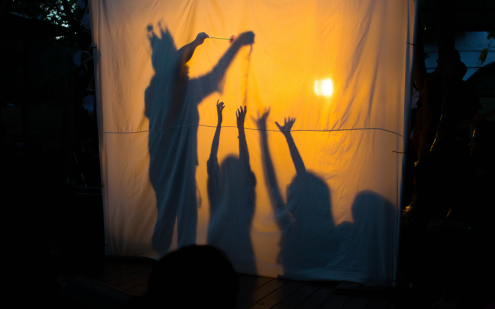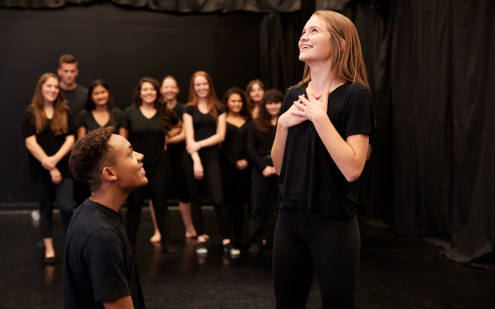We talked about all things Dolly with musical star Steven Webb, including her iconic status, favourite hits, how it is hard not to be a fan of the country music legend, and what it is like to star in a musical based on all her hits.
What can audiences expect when they come to see the show?
Apart from the obvious thing of hearing all of Dolly Parton’s biggest hits and your favourite Dolly Parton songs, there’s a bucketload of stage magic and illusion. But I think the unexpected thing is that audiences can really relate to it. Even though it’s a singular story about a singular person, every single person went through some of the same things during lockdown. There are a lot of nuances and little reminders that will take audiences back to that time. In my experience, every time I speak to people about it it’s like we’ve compartmentalised it. It’s almost like it didn’t happen, so it’s cathartic and therapeutic going back to that time. But it isn’t all doom and gloom; it’s very light and it’s about a journey and navigating through that.
Who is Kevin and what is his role in the story?
He describes himself as a has-been-who-never-was comedian. So, he’s an aspiring comedian and he works at a comedy club, but he’s one of those people that are naturally hilarious when he’s not trying to be. Then when he tries to make you laugh it’s met with silence, and I think that there’s something so endearing about people like that. He wants to be funny but when he tries, he’s not funny at all. He works at a comedy club in London and his narcissistic boyfriend has just broken up with him. They were isolating together and now he has to be sequestered to his parents’ attic back in Halifax, where he has all of his old childhood memorabilia. It used to be his den and it’s especially full of his old Dolly Parton memorabilia, being that he’s a superfan.

How does Dolly herself come into the picture?
Kevin starts to self-medicate and he’s having a bit of a rough time. He loses his job, he’s lost his relationship, and he’s surrounded by all these childish things. He’s a bit down and out and feels like he has nothing. Then through necessity and magic and music he puts on Dolly’s Here You Come Again album. She materialises and almost stages an intervention to help him through this time using tough love. She doesn’t solve anything for him, she just gives him pointers. There’s a line in one of her songs, Better Get To Living, which is about how all healing has to start with you. The show is about that journey of self-recovery and self-discovery and listening to that inner positive voice.
Does Kevin’s narrative mirror your own in any way?
Hugely, to the point where when I first read the script I nearly had to lawyer-up because I felt like I’d been surveilled throughout the pandemic! I’m four years sober now, and I got sober in April 2020, a few weeks into the lockdown. Like a lot of people, I was self-medicating because we were forced to sit with ourselves and look at ourselves. What is really beautiful is that our director Gabriel [Barre] allowed me to bring a lot of my own experiences to the character and to the show, so we’ve sort of worked with my personal journey and put quite a lot of that in there. It’s incredibly therapeutic and cathartic for me to go back to that time, as I think it will be for the audience.
Are you a Dolly Parton fan?
Again, hugely! And I have a very specific parallel with this character because back in 2002, I think it was, I was going through a rough time with a boyfriend that I had. Dolly was doing a one-night show at the Hammersmith Apollo in London, and I just got myself a ticket and went on my own. It was an unbelievable experience because you had so many different groups and types of people in the audience. You had drag queens and housewives and just this massive mix of people, but what struck me most was seeing how many other people were there alone. You don’t often get that at concerts, and it was the most incredible experience because we all obviously went there for a reason and we got what we came for because there was something magical about Dolly’s message and her strength and her power. It truly helped me and that is what I mean about when I read the script for Here You Come Again. It felt a bit like reading my own Truman Show.

Why do you think Dolly is such an icon for the LGBTQ community?
I think it’s because she’s always refused to be confined to the parameters presented to her. Even some of her earlier songs, like Dumb Blonde and Just Because I’m A Woman, are about taking a swipe at the gender divide and the inequalities of the world. She has this unflinching non-conformist attitude and she’s managed to maintain that message. For the queer community we see someone who demands respect, ignores gender expectations and promotes love and tolerance whilst remaining true to and promoting her faith. She’s proof that kindness is key. She’s such a role model in that way.
And why do you think she’s so beloved by everyone across the board?
Because she’s maintained consistency. She’s never bowed down and she makes her own way of doing things because, as I said, she never follows the rules, yet she manages never to p**s anyone off. Also, she doesn’t allow anyone to get in there first with any possible negatives. She’s always the first to get in there herself, so for any small thing that anyone may not like about Dolly Parton, they can’t bring it up because she’s already covered it. She’s already pointed it out herself. She’s just this almost perfect human being and she’s an inspiration in the way she carries herself and how she lives her life.
Do you have a favourite song in the show?
It’s probably a tie. Two Doors Down is one of my favourite Dolly Parton songs of all time and in the show it is just a joyous moment, a kind of imaginary party in Kevin’s head where even Boris Johnson makes an appearance because as we all know he loves a party during lockdown! But I think my absolute favourite would be Why’d You Come In Here Lookin’ Like That because it’s a remixed techno clubby version. I don’t want to give anything away, but you’ll be able to see me like you’ve never seen me before. Let’s just say that I’m currently trying to find a way to balance in six-inch heels!
If you got to meet Dolly, what’s the one thing you’d want to ask her?
I don’t think I’d ask her anything. I would just thank her for what she’s given to the world and continues to give to the world.
After a long run in The Book Of Mormon, how is it being in a brand new musical?
It’s wonderful and it’s such a different experience. When I joined The Book Of Mormon, which I ended up being in for nearly seven years, it was three years into its run, so it was already the hot ticket in town. I knew what I was going into, and I came in halfway through a contract, so I rehearsed on my own. I learned the entire show in 12 days on my own and I didn’t get to actually do it with the cast until the first day I was on. That process was terrifying and quite isolating but with this we’re starting from the ground up, being in a room where even though the show has been done before in the States, not everything is set in stone. It has been Anglicised and it’s organically taking on a new shape. It is the most collaborative room I’ve ever been in and everyone is allowed input. It’s not just ‘This is what you do’ or ‘This is where you stand’ because it’s tried and tested. It’s a fully collaborative effort and also watching Tricia Paoluccio embody and transform into Dolly every day is uncanny. You feel the warmth of Dolly every single day. It’s incredibly magical.
What do you see as the key message of Here You Come Again?
Apart from what I said earlier about how all healing has to start with you, as Dolly sings in those lyrics, I think it’s about finding the volume control on your inner voices. We all have a positive and a negative voice inside us and as adults I think our default setting is to have the negative voice louder than the positive. So, it’s about finding those dials and levelling them, if not allowing the positive voice to become louder.
Here You Come Again is at Norwich Theatre Royal between 8 – 12 October. For more information or to book, visit norwichtheatre.org or call the Box Office on 01603 630 000.



